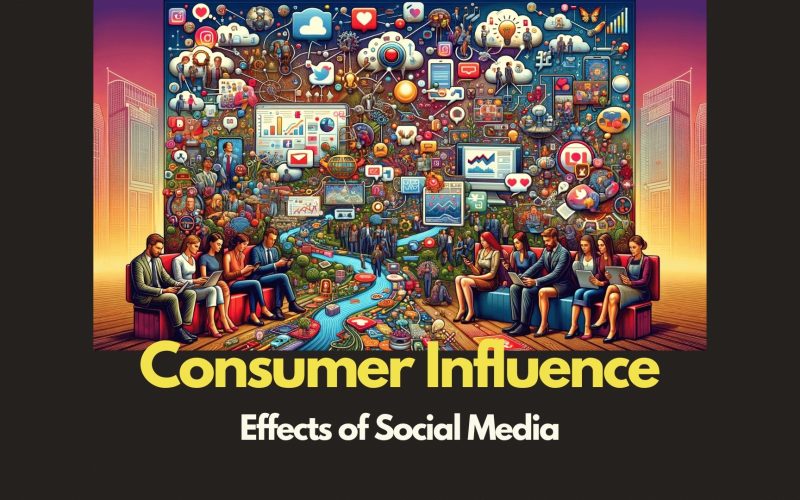In the digital age, social media has revolutionized the way discover, research, and engage with brands and products. The impact of social media on consumer behavior is profound, influencing purchasing decisions, brand perception, and shopping preferences in today’s interconnected world. As individuals increasingly turn to social platforms for product recommendations, reviews, and inspiration, businesses must understand and leverage the power of social media to connect with consumers, drive sales, and build lasting relationships. Let’s explore the transformative influence of social media on consumer behavior and how businesses can adapt their strategies to meet the evolving demands of the digital marketplace.
1. Influence of Social Proof and Recommendations:
One of the significant ways in which social media impacts consumer behavior is through social proof and recommendations. Consumers rely on social platforms to seek validation from their peers, influencers, and online communities when making purchasing decisions. Positive reviews, testimonials, and recommendations shared on social media can sway consumer perceptions, build trust, and influence buying choices. The interactive and transparent nature of social media enables consumers to access real-time feedback and insights, shaping their perceptions of brands and products.
2. Power of Visual Content and Influencer Marketing:
Visual content on social media platforms plays a vital role in capturing consumer attention, evoking emotions, and driving engagement. Influencer marketing, where influencers collaborate with brands to promote products and services, has become a prevalent strategy to leverage the reach and influence of popular social media personalities. Consumers are drawn to authentic, visually appealing content shared by influencers, which can spark interest, inspire purchase decisions, and shape consumer behavior by creating aspirational lifestyles and experiences.
3. Engaging Customer Service and Support:
Social media has transformed the way companies interact with consumers by providing a direct channel for customer service, support, and engagement. Consumers now expect real-time responses to their queries, complaints, and feedback on social media platforms. Brands that prioritize responsive and personalized customer service on social media can enhance consumer trust, loyalty, and satisfaction. By addressing consumer concerns promptly and transparently, businesses can positively impact consumer behavior, fostering a positive brand image and relationship with their audience.
4. Personalization and Targeted Advertising:
The personalization capabilities of social media platforms enable businesses to deliver targeted advertising, tailored content, and personalized experiences to consumers based on their demographics, interests, and behaviors. By utilizing data-driven insights and algorithms, businesses can create highly relevant and engaging ad campaigns that resonate with individual consumers. Personalized marketing strategies on social media can influence consumer behavior by delivering customized messages, promotions, and recommendations that cater to individual preferences and needs.
5. Social Commerce and E-Commerce Integration:
The rise of social commerce, where consumers can discover and purchase products directly within social media platforms, has had a significant impact on consumer behavior. Social media platforms offer seamless e-commerce integration, enabling consumers to shop, browse, and make purchases without leaving the platform. The convenience and immediacy of social commerce influence consumer buying decisions by simplifying the shopping process, providing social validation through likes and shares, and offering a streamlined shopping experience that aligns with consumer preferences and behaviors.

6. Building Brand Awareness and Engagement:
Social media serves as a powerful tool for building brand awareness, engaging consumers, and fostering brand loyalty. Through content creation, community building, and social engagement, businesses can increase their visibility, reach new audiences, and cultivate relationships with consumers. Consistent and authentic brand messaging on social media influences consumer behavior by shaping brand perceptions, creating brand affinity, and fostering emotional connections that drive consumer loyalty and advocacy.
7. Trends, Influencer Marketing, and FOMO:
Social media is a hub for trendsetting, influencer collaborations, and the creation of a fear of missing out (FOMO) among consumers. As consumers seek to stay current with the latest trends, products, and experiences, social media plays a pivotal role in shaping consumer aspirations and purchase decisions. Influencer endorsements, product launches, and limited-time offers on social media platforms can create a sense of urgency and exclusivity that motivates consumer behavior, driving engagement, sales, and brand loyalty.
8. Consumer Empowerment and Advocacy:
Social media empowers consumers to voice their opinions, share experiences, and advocate for causes that align with their values. Consumer advocacy on social media can influence brand reputation, product perception, and consumer behavior through user-generated content, reviews, and online discussions. Brands that engage authentically with consumer feedback, address social issues, and demonstrate corporate social responsibility can establish meaningful connections with consumers, foster brand advocacy, and drive positive consumer behavior that aligns with their values and beliefs.
9. Social Listening and Consumer Insights:
Social media provides businesses with a wealth of consumer insights, feedback, and sentiment analysis through social listening tools and analytics. By monitoring conversations, trends, and mentions on social media, businesses can gain valuable insights into consumer preferences, sentiments, and behaviors. Social listening allows businesses to adapt their strategies, products, and messaging based on consumer feedback, enabling them to meet consumer expectations, address emerging trends, and shape consumer behavior to drive engagement and loyalty.
10. Evolving Strategies for a Connected World:
As social media continues to shape consumer behavior and influence buying decisions, businesses must adapt their strategies to meet the changing needs and preferences of consumers in a digitally connected world. By embracing the transformative impact of social media on consumer behavior, businesses can cultivate meaningful relationships, deliver personalized experiences, and drive engagement that resonates with today’s informed, empowered, and socially conscious consumers. By staying agile, responsive, and customer-centric in their social media strategies, businesses can leverage the power of social media to connect with consumers, drive conversions, and inspire loyalty in a dynamic and competitive marketplace.










